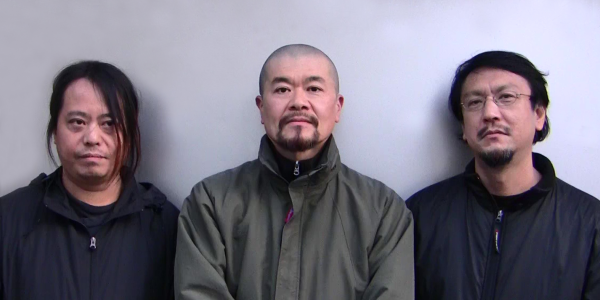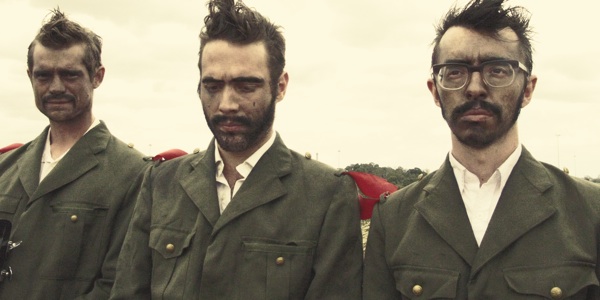Noise rock is arguably one of rock ’n’ roll’s most perplexing splinter genres.
Noise rock is arguably one of rock ’n’ roll’s most perplexing splinter genres. To its practitioners and supporters, noise rock is an ethereal experience, an excursion into powerful, and rewarding, sonic pastures. For the great unwashed, noise rock is the antithesis of music – dark, angry, threatening and too weird to comprehend. Kazuyuki Kishino – aka KK Null, leader of Japanese noise rock band Zeni Geva – isn’t even prepared to offer an opinion on the attraction of noise rock. “What is ‘noise rock’ and what is not ‘noise rock’? I don’t understand,” Null says enigmatically.
Null began performing music in the early 1980s: “My first musical influence was Pink Floyd,” he recalls. In 1987 Null teamed up with guitarist Mitsura Tabata and drummer Tatsuya Yoshida to form Zeni Geva, with the band’s name translating roughly to ‘money violence’. “Zeni is an old Japanese term that means ‘money’ and Geva is German – ‘gewalt’ means violence or power,” Null explains.
The band’s name offered a reasonable indication of where Zeni Geva saw their music heading. “The music we wanted to create when we first starting playing as Zeni Geva was hard, heavy, aggressive and progressive,” Null figures. In addition to his 1970s progressive rock influences, Null has been quoted referring to his indulgence of French literature in his youth. Unfortunately for the cause of Franco-Japanese literary noise rock, Null admits to only minor influence of French literature on Zeni Geva’s music. “I really enjoyed reading the books of the French author, Jean-Marie Gustave Le Clézio,” he notes.
After releasing the debut Zeni Geva album, How To Kill, and sophomore record Maximum Love And Fuck, Null headed to the United States in 1991, playing under his own banner. While performing in San Francisco Null was lucky enough to meet former Dead Kennedys lead singer Jello Biafra, who offered to release the band on Biafra’s Alternative Tentacles label. “Jello came to see the first KK NULL concert in San Francisco in 1990 and gave me his CDs. When we came back as Zeni Geva in 1991 Jello said he wanted to release our recording,” Null recalls.
It was around this time Zeni Geva drew the attention of former Big Black guitarist Steve Albini, who offered to record the band’s next record. Within a short period, Albini had also graduated to joining Zeni Geva on stage. “It happened spontaneously,” Null replies, when asked whether Albini was invited to play with the band, or if he offered. “So it doesn’t make sense to say who’s the first or not.”
Over the years Zeni Geva have found themselves tagged with many labels – noise rock, heavy metal, progressive rock and even psychedelic. Not surprisingly, Null doesn’t care too much for labels of any description. The psychedelia tag isn’t offensive, but says more about the observer than the subject. “Whether Zeni Geva is psychedelia depends on what your definition of ‘psychedelic’ is,” Null figures. “Classification isn’t important to me and I don’t care personally. But I know it’s human nature that you cannot help labeling and naming anything, otherwise you feel unease,” he intones.
While noise rock has found a place in the margins of rock ’n’ roll scenes the world over, Null isn’t prepared to analyse the differences between the Japanese noise rock scene and comparable scenes in other countries. “I have no idea what’s different between the Japanese noise rock scene and what’s going on in other countries,” he admits heartily.
In the early part of this millennium Zeni Geva entered into a period of hiatus, with Null pursuing his own solo – including electronic – activities. “With my solo music, I try and go beyond time and space!” Null explains. In 2009 Null contacted Yoshida, who’d left the band in 1990 and asked him if he was interested in rejoining Zeni Geva. “One day I just called him and he said ‘OK’!” Null laughs. The period of abstinence had, Null says, re-energised Zeni Geva. “Absolutely!” he admits. “Yoshida rejoined the band for the first time in 20 years and as you know he is an incredibly amazing drummer and composer as well. He brings a lot of ideas, inspiration and energy to Zeni Geva.”
Almost 25 years after their formation, Null says Zeni Geva is still evolving. “Maybe we have a basic Zeni Geva style and sound though, we’re not satisfied yet and don’t like to repeat same things. We believe there’re plenty of possibilities and potentialities to evolve.”
ZENI GEVA, f or the first time in 14 years, return to Australia and you can see them live at HEATHEN EARTH, in The Gershwin Room at The Espy this Sunday September 26 alongside The Nation Blue, Useless Children, Blarke Bayer-Black Widow, Whitehorse, River Of Snakes, Fire Witch and Bowcaster. Tickets available now through Oztix. ZENI GEVA also play STATIC AGE on Saturday October 2 with Dead C, Oren Ambarchi and heaps more, with a venue TBC. Check out heathenskulls.com for more info.







